Georgia: Magnet for Growth
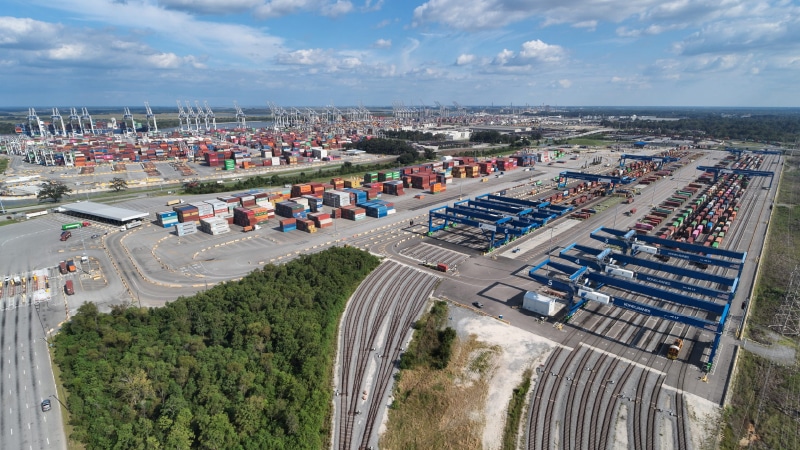
Leadership in logistics propels the Peach State’s success in attracting business and driving growth.
Why Georgia? For economic development and logistics professionals, the question seems to have as many answers as the state has peaches.
Whether it is for Georgia’s favorable cost of living, business-friendly policies, superior workforce, educational assets, or solid air, land, and sea resources, logistics and other companies consistently choose Georgia because they know they can rely on the state’s pro-business culture and infrastructure to sustain growth.
“Successive governors, local and community elected leadership, and the Georgia General Assembly have consistently supported our partnership approach to economic development, allowing our state and local teams to be responsive to business,” says Pat Wilson, commissioner of the Georgia Department of Economic Development.
“Our university system and technical college system of Georgia have been ahead of the curve in working with us to prepare Georgians for the workforce needs of tomorrow, giving Georgia a competitive advantage,” Wilson adds.
Reflecting this growth trajectory, Gov. Brian Kemp announced in February 2024 that Doowon Climate Control America, a South Korea-based auto parts manufacturer and supplier, will invest more than $30 million in a new manufacturing facility in Metter, in eastern Georgia. The company will be a key supplier for Kia Georgia and Hyundai Motor Group.
“Georgia’s growth as a national leader in auto manufacturing continues to pay dividends for communities in all four corners of Georgia,” Kemp said.
Georgia’s vast business network goes well beyond automaking, embracing everything from tourism to health care. The support of the state’s logistics providers is as strong as the network they serve.
Technology and Workforce Are Major Draws
For Duane Kalinowski, founder, owner, and CEO of All Points, a multi-faceted 3PL based in Atlanta, the greatest logistics asset of the state he adopted as his home 30 years ago is the quality of its workforce—particularly those who work for All Points. “We have an unbelievable workforce here,” he says.
Kalinowski opened the company with a mattress—he lived inside his warehouse—and a fridge, a TV, his dog Baxter, and an entrepreneurial spirit on June 1, 1995. All Points has now grown into an industry leader in fulfillment and distribution, print and promotional product management, ecommerce, direct response project management, retail display production, and 3PL services.
Several members of his executive team began with the company more than two decades ago—Controller Sandra Duncan, for example, and IT Director Adam Zawacki, a Georgia Tech industrial engineer grad who spearheads constant evaluations of fulfillment processes, looking for ways to improve efficiencies and reduce costs.
Kalinowski puts a high premium on All Points’ tech stack, believing it is a vital key to logistics success. “If you’ve been in business 30 years,” he says, “you have to stay on the cutting edge of technology—or you’re not going to be in business.”
Those two keys—technology and workforce—make Georgia an ideal logistics home, Kalinowski believes, citing the outstanding logistics degree programs offered by the state’s colleges and universities. All Points hires many graduates of Georgia Tech, “which is in All Points’ backyard,” he says.
Building on Logistics Advantages
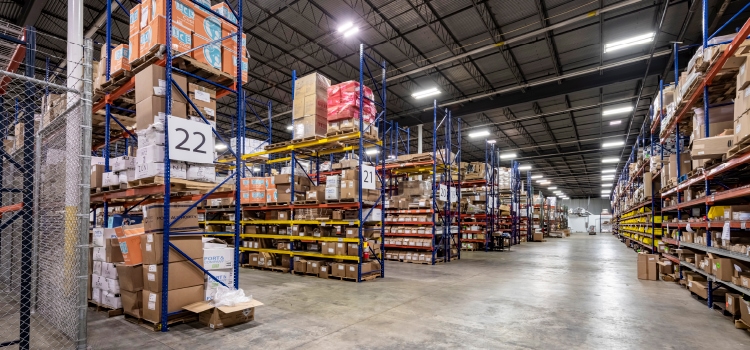
All Points provides fulfillment and distribution, print and promotional product management, ecommerce, direct response project management, retail display production, and 3PL services.
“Think about both the culture and tremendous education resources for logistics in Georgia,” Kalinowski says. “Not only that, think of all the trade shows and economic forums, the Atlanta Chamber of Commerce and how they all work in unison for the logistics hub that Atlanta has become.
“These are efforts that start at the governor’s level and work their way down to the local level,” he adds. “It’s no mistake that Atlanta has the largest airport, the most trafficked in the world, and that UPS is located here.”
Additionally, he says, “Georgia’s miles and miles of actual freeway help us with time to market. All these things—from the support of the governor’s office to the logistics infrastructure and economic forums—work together to perpetuate Georgia’s logistics advantage. It has taken off to the point it’s hard for other regions to catch up to what we have here.”
Since he landed All Points’ first major contract with Coca-Cola shortly after he opened the company—leading to a contract to distribute some $80-to-$100 million of Olympic pins for the 1996 Summer Olympic games held in Atlanta—Kalinowski has capitalized on Georgia’s rich logistics resources to achieve remarkable growth.
He believes the strength of the Georgia logistics environment—along with treating his team members as partners in the business—will keep the company thriving long into the future.
“When I meet with prospective companies, I sell the culture of our workforce and our ability to solve problems,” Kalinowski says. “Atlanta has such a great logistics network. It really gives us an edge, being here in Atlanta. There’s a lot of opportunity here.”
Focusing On Ports and Progress
Georgia’s logistics assets acted quickly and effectively to meet the pandemic-related challenges of all types of infrastructure faced with surging consumer demand. Case in point: Georgia Ports.
Aside from the period affected by the pandemic, 2023 was the best calendar year on record for containerized trade for Georgia Ports, according to the Georgia Ports Authority (GPA), which oversees the state’s two deep-water ports and three inland terminals. “Georgia Ports’ demand for containerized imports normalized since the end of the pandemic,” says GPA President and CEO Griff Lynch, who adds that GPA is using this time to invest in capacity for future needs.
“GPA is committed to investing $4.2 billion in the next 10 years,” Lynch says. “With the new year, we are beginning to see renewed strength in container volumes, which should result in more favorable comparisons moving forward the next six months.”
In terms of roll-on/roll-off (Ro/Ro) cargo, the Port of Brunswick handled a record 775,565 units of autos and machinery in calendar year 2023, an increase of 15.6% over the previous year. At its current rate of growth, the Port of Brunswick is poised to become the nation’s busiest gateway for Ro/Ro cargo.
Expanding both trade and capability at the flagship ports of Savannah and Brunswick is part of a two-pillar strategy at GPA, with Savannah focused on containers and Brunswick focused on Ro/Ro trade. Both pillars of GPA’s business will be positively impacted by the growth of manufacturing in Georgia, such as the new Hyundai Meta Plant now under construction in Elabell, on the outskirts of Savannah.
Boosting Capacity
Because the threat of supply chain disruption is a constant, GPA’s infrastructure investment philosophy is to have 20% more capacity than the current cargo demand, thus enabling its terminals to better absorb sudden influxes, Lynch says.
Capacity-building projects include Garden City Terminal West at the Port of Savannah, which will add 100 acres and 1 million TEUs of annual capacity adjacent to Garden City Terminal proper. Now 70% complete, the yard will offer a new, long-term storage option for port customers to help them flex to supply chain demands.
GPA also is expanding its inland port offerings. Along with the existing Appalachian Regional Port in Northwest Georgia, GPA is building the Blue Ridge Connector rail terminal near Gainesville, Georgia. Additionally, North Carolina importers and exporters can tap into a faster supply chain through a direct rail connection between Savannah and Rocky Mount, North Carolina, via the CSX Carolina Connector (CCX) intermodal terminal. Supporting GPA’s intermodal cargo expansion is the Mason Mega Rail Terminal in Savannah, a foundational gateway terminal component.
Lynch credits state infrastructure improvements for making the ports’ growth possible. “GPA has been able to add capacity because of unmatched room for expansion on the 1,500-acre Garden City Terminal in Savannah and the 1,700-acre Colonel’s Island Ro/Ro Terminal at the Port of Brunswick,” he says.
“GPA has strong partners in the Georgia Department of Transportation and the Georgia Department of Economic Development in terms of building a robust statewide freight transportation system, and attracting companies to build or expand in Georgia,” Lynch adds. “Both help to drive business through Georgia Ports. Georgia is a truly integrated state when it comes to attracting and keeping business.”
Providing Knowledge and Power
Prominent among the vast array of Georgia’s unique logistics resources is SMC³, a one-stop knowledge hub for everything less-than-truckload (LTL). Shippers, carriers, logistics service and technology providers rely on SMC³ to translate intricate LTL transportation pricing and transit detail into data-centric solutions, spanning the entire shipment life cycle.
A trusted industry partner for more than 88 years, SMC³ is an established thought leader, hosting premier supply chain conferences and educational events across North America.
“Our status as a trade association provides close connections to all less-than-truckload carriers across North America,” says Brian Thompson, the organization’s chief commercial officer. “SMC³ utilizes our proprietary technology infrastructure to connect asset-based providers with their customers, shippers, and logistics service providers, with high-speed connectivity around the clock.”
Leading the LTL Industry
Based in the master-planned community of Peachtree City, just south of Atlanta, SMC³ is at the center of the $50-billion LTL industry, managing more than 4 billion pricing and transit transactions per month. To help accomplish its goals, the organization accesses the knowledge and power of the state’s leading logistics innovators and thinkers.
For example, SMC³ partnered with logistics professor Dr. Karl Manrodt at Georgia College & State University to develop and launch a new online educational program focused on the LTL industry.
“The educational program is a self-paced, online program leveraged by some of the largest logistics providers across the country,” Thompson explains. “So many new people have entered the industry in the past four years that educational programs are imperative to prepare them for these careers.”
The infrastructure—from fiber cable to roads and bridges to the busiest international airport in the country—all enable SMC³ to be effective in reaching its audience across the country, he adds.
Post pandemic, SMC³ has shifted from requiring all employees to work from the office to allowing them to work either in the office or remotely. This policy has allowed SMC³ to attract and retain top talent from across the state and the country, Thompson says.
SMC³ has greatly increased the use of videoconferencing and online media in its new educational programs for the freight industry. Additionally, it hosts monthly hybrid learning programs with panels of guest speakers discussing critical issues facing the freight industry and solutions to those issues.
SMC³ now offers Dynamic PriceBuilder®, a new application that lets carriers develop rates dynamically and enables them to make better pricing decisions. Through the tool, carriers can manage yield versus volume with on-demand control pricing and access levers, including location, weight, density, day of the week, and calendar date.
“With this dynamic solution, carriers immediately feel the impact of enhanced visibility into load-level costs, pricing, and profitability paired with their custom business rules engine to provide the data needed to quickly offer customer-specific pricing on a shipment-by-shipment basis,” Thompson says.
SMC³ continues to develop integrations to connect shippers, logistics service providers, and their asset-based providers across the freight industry.
“There is a tremendous demand to digitally connect and leverage data to create automated solutions that result in savings and more effective management across the supply chain,” Thompson says. “SMC³ is the premier provider of API and EDI integrations for the less-than-truckload industry.”
Recruiting the Best
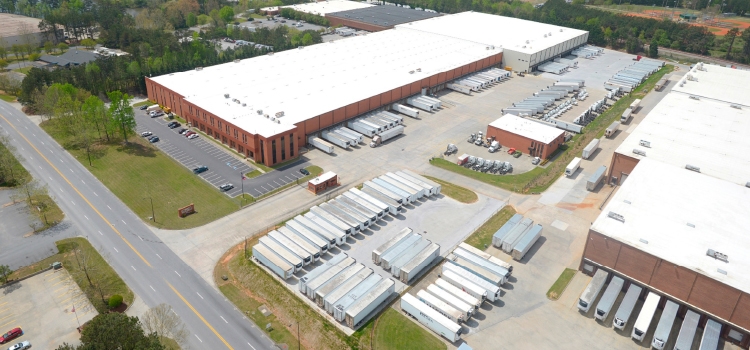
Atlanta Bonded Warehouse is a leading provider of temperature-controlled 3PL warehousing, co-packaging, and LTL/TL transportation services in the Southeast.
For Atlanta Bonded Warehouse (ABW), the Southeast’s leading provider of temperature-controlled 3PL warehousing, co-packaging, and LTL/TL transportation services, the new year has brought about a heightened focus on recruiting and hiring the best of the best among Georgia’s superior logistics workforce.
Hal Justice, ABW’s vice president of sales and operations, says this focus means finding new ways to attract a new generation of technology-savvy employees.
“Our wage and benefit packages are exceptionally competitive for our industry and for the markets in which we have operations,” he says. “But today we are recruiting a different generation of 18-to-26-year-olds who do not respond as well to the recruiting efforts that have been historically successful.”
Both the demands of the industry and the skills and expectations of potential employees are putting a premium on applications of technology.
Enhancing Technology
“We’re enhancing our technology beyond just pure materials-handling movement and engaging automation where it makes sense and is cost-effective,” Justice says. “It’s not just moving pallets. Paying people for hours to move pallets from one end of the warehouse to another does not add value to our business process, and does not develop the skills our employees want or need. It’s not a good use of resources.”
Such tasks are not especially attractive to upward-bound workers either. Having almost halved the progression from starting wages to mature wages was helpful but still not enough.
ABW is aggressively recruiting online for new employees for positions in warehousing, transportation, and co-packaging. The growth in the company’s business means opportunities for new employees and for promotion for existing employees.
“We get lots of online inquiries every day,” Justice says. “We get from four to six inquiries every day regarding employment. When you think 20 a week or 1,000 a year is pretty good, you need to realize this is only the top of the funnel. Successfully recruiting, training, onboarding, and ultimately retaining is a long way from the top of the funnel.”
ABW is considering hiring a full-time recruiter to enhance its efforts to keep its workforce on top. At the same time, the company continues to measure productivity through “engineered standards”—using technology to carefully measure workers’ time management. The combination of these efforts enables ABW to mitigate cost increases—and, as a result, its costs to customers.
Automation is not a panacea, Justice says. Equipment must be carefully selected to fit the application, then calibrated and continually monitored to make sure it is doing what you tasked it to do. “Quality and safety remain most important,” he says. “Nothing suffers.”
ABW pays keen attention to industry measurements of success. “We’re holding our own in the industry with KPIs (key performance indicators),” Justice says. “I would put our numbers up against any of our competitors and we have some great competition.
“We focus on being a high-performance, low-noise operator. We’re in the top 50 of U.S. 3PLs. Everyone says size has its advantages and we would agree,” he continues. “Smaller has its advantages. Our size makes us more agile. We can make decisions quicker, make changes to our technology quicker, and change mid-course a lot easier. We don’t have to go through management hierarchy for approvals. We make two calls, meet for five minutes, and just do it.”
All of this takes place in the environment of an extraordinarily business-friendly state. “Georgia has done an incredible job of making the state a preferred location for industry,” Justice says. “Georgia has done a solid job of attracting business. We’ve got a good workforce and we’re always attracting more manufacturing. More and more of our customers are looking at how they can manufacture or process their products here and not rely on someone 8,000 miles away and where it takes five or six weeks to get here on a container. The pandemic taught everybody the value of shortening their supply chains.”
Forging Ahead

Syfan Logistics Executive Vice President Steve Syfan (left) credits Gov. Brian Kemp (right) and others in state government for their ongoing support of business in Georgia.
Steve Syfan, executive vice president of Syfan Logistics, is equally bullish on both the field of logistics and the company’s Georgia home.
“Georgia is a very forward-thinking state,” says Syfan, whose company is located some 50 miles northeast of Atlanta in Gainesville, Georgia.
Syfan Logistics specializes in the transportation of refrigerated/frozen foods and manufactured automobile parts as well as the transportation of pharmaceutical products. The company moves many pharmaceuticals that have special temperature regulations and specifications.
The critical importance of the company’s specialized services was made manifest at the height of the pandemic, and Syfan says the business-friendly environment of the Peach State was especially helpful during that challenging time.
“Georgia did not shut down like some other states did,” Syfan says.
He credits Gov. Brian Kemp and others in state government for their ongoing support of business. For 10 years in a row, Georgia has been recognized as the country’s best state for business.
Syfan Logistics, in turn, invests heavily in the future of Georgia logistics. Steve’s father and company founder Jim Syfan serves as a member of the University System of Georgia’s Board of Regents.
The company has established internship programs with several of the state’s leading colleges and universities, including the University of North Georgia, North Georgia Technical College, Georgia Southern, and University of Georgia. The company also works with Appalachian State University in North Carolina and the University of Tennessee.
“The majority of the population doesn’t even know this industry exists, except that they see the trucks on the road,” Syfan says, adding that he believes the next generation should be educated on how logistics represents a rewarding career path with rich opportunities for growth. Syfan Logistics offers a mentorship program and currently has one dozen employees in its training department.
Nurturing Entrepreneurs
Syfan is proud that as many as 17 other logistics companies have been spawned by individuals who began their careers at Syfan Logistics. “There’s enough for everybody,” he says, “and they make us better.”
He points out that his father was an entrepreneur, and the company encourages individual success. “We don’t have non-competes; I don’t believe in them,” Syfan says. “It would be wrong to say you can’t better yourself if this is what you believe you need to do.”
Another expression of the company’s culture is the fact that employees are not described as working “for” the company but rather “with.”
“It’s just a word but it’s a big word for us,” Syfan says. “We work with each other.”
It all goes back to the code his father put in place when the company was established. “My dad said back in 1984, our number-one principle is we’re going to do the right thing and we’re going to do it every time. And because we’re human, if we don’t do the right thing, we’re going to make it right.
“We do that internally and we do it externally. That’s always our goal,” Syfan adds.
Syfan believes a persistent challenge for logistics and other industries is the need for tort reform, and once again he is buoyed by the forward thinking of Georgia’s state officials.
“I’m very encouraged by what our legislators are doing,” he says. He is optimistic that “substantive decisions” are being formulated to further help Georgia continue to compete and grow.
Room to Grow and Flourish
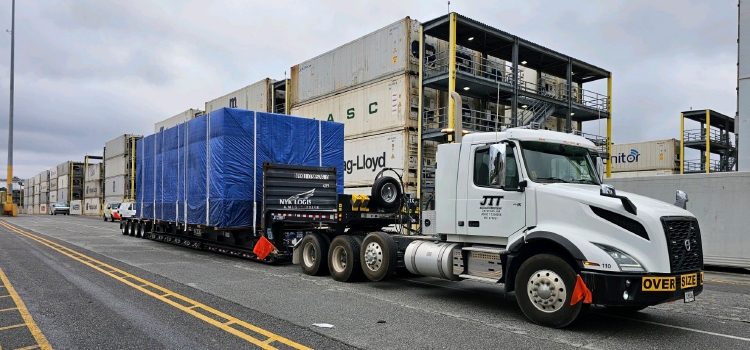
Savannah-based JIT Warehousing & Logistics delivers just-in-time service with responsiveness and a personal touch.
Asked for her perspective on the most important assets of Georgia that help qualify the region as ideal for logistics, Anna Lockwood, vice president of Savannah-based JIT Warehousing & Logistics, doesn’t hesitate.
“A large port with steady growth is essential,” she says. “And so is having lots of options to move the cargo and containers from the port, particularly rail. That’s important too, as well as having ample warehouse space.
“Fortunately, we have all of that and more in Georgia,” she adds. “Our warehouse space is constantly expanding to meet ever-increasing demand.”
Evie Goldberg-Davis, JIT’s executive vice president, agrees. “Having the space geographically to grow is vital,” she says. “And not just the Georgia Ports Authority, but private terminals and warehouses in Savannah and throughout the state; developing inland ports and expanding the rail infrastructure and roadways connecting the Savannah terminal hub to the entire region.”
Ben Goldberg, the company’s president, adds this key ingredient to the region’s success: “Rapid expansion of manufacturers building plants in Georgia.”
In other words, it’s all about growth. And when it comes to logistics, growth not only defines Georgia in general but JIT specifically.
A family business, JIT was founded more than three decades ago by Ben Goldberg with the idea that companies in the Southeast, particularly those that receive seaborne products via the Port of Savannah, need world-class logistics support.
The company has five locations, all of which are within 3.5 miles of the Savannah port’s Garden City Terminal and one of which is within a half mile of the port’s Garden City Terminal.
Providing Responsive and Personalized Customer Service
As the company’s name suggests, JIT’s mission is to deliver just-in-time service to its clients. It accomplishes that mission by having big-company capabilities while providing small-company responsiveness.
Its experience, family ownership, and flexibility set it apart. “We’re big enough to support some of the world’s largest companies, and small enough to give small and mid-sized companies the very best in personalized customer service,” Goldberg says.
Adding greener low-emission trucks (CNG trucks) to the company’s asset fleet and building rail capacity are examples of JIT’s forward-thinking decision-making that enables the company to keep pace with the growth of Georgia itself.
A new location with Norfolk Southern and JIT’s expanded heavy-haul/cargo fleet to accommodate new facilities and plants being built in the region further solidify the company’s standing as a star in the logistics constellation of Georgia.
Establishing A Solid Foundation
For more than a century, Georgia has fostered healthy industry practices, encouraged collaboration and innovation, and positioned itself as a leader in developing and harnessing emerging technologies, including for the evolving automotive and mobility industry.
As the electric vehicle market continues to grow, for example, Georgia has pursued the entire supply chain, creating more than $25.7 billion in investments and 30,200 jobs since 2018.
Other industries thrive as well. For example, Gov. Kemp recently announced Gerresheimer, a manufacturer for the pharma and life science industry, will invest more than $88 million in expanding its manufacturing operations in Peachtree City in the southern Atlanta metropolitan area. Dusseldorf-based Gerresheimer currently supports more than 260 jobs in Georgia, and its existing manufacturing facility will support an additional 180 jobs with operations beginning in April 2024.
“Employers from across the globe can find a skilled workforce here that we continuously invest in through innovative programs like the GEORGIA MATCH Direct College Admissions Initiative,” Kemp said.
The program, officially launched in 2023, is intended to make higher education more accessible to Georgia’s youth, and it helps pave the way for a new generation to continue Georgia’s leadership in logistics.
The state’s pursuit of this type of leadership in logistics, together with its other assets, continues to successfully attract business and drive growth.
Georgia Logistics: 7 Stunning Stats
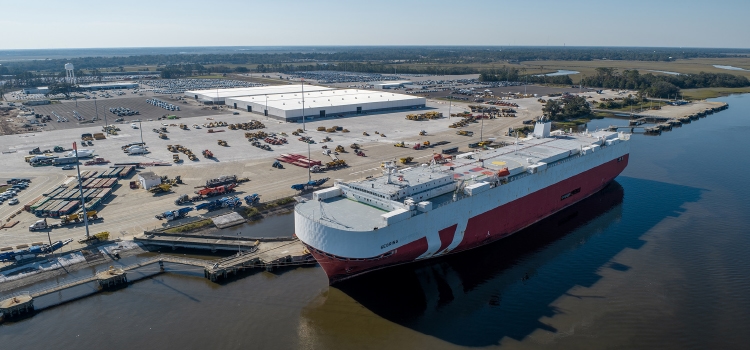
Port of Brunswick (photo courtesy of the Georgia Ports Authority)
Across every category, Georgia’s advantages as a logistics hub can be quantified with eye-popping numbers. Here are a few:
1. Georgia has a labor force of 5.3 million, with an especially strong talent pool in transportation and material moving.
2. The state’s logistics sector is powered by more than 15,000 logistics establishments employing more than 181,000 people in direct logistics industry jobs.
3. The University System of Georgia is made up of 26 higher education institutions, of which 25 offer concentrations and degrees in logistics and supply chain.
4. Georgia has 327 public and private airports, including 105 public-use airports. Two international airports—Hartsfield-Jackson Atlanta and Savannah/Hilton Head—and nine of the top 10 cargo airlines in the world call Georgia home.
5. The state has 1,244 miles of interstate highways, 81,829 miles of country roads, 19,095 miles of state highways, and 13,731 miles of city streets.
6. With more than 4,600 miles of active rail lines, Georgia has the largest rail network in the Southeast. The railroad system in Georgia includes 28 freight railroads, including two Class I railroads—Norfolk Southern and CSX. Georgia provides direct rail access to the Mid-Atlantic, Northeast, and Midwest regions of the United States.
7. Georgia’s two deep-water ports in Savannah and Brunswick, together with inland terminals in Chatsworth, Bainbridge, and Columbus, are gateways to the world. Sitting on 85 acres at the Port of Savannah, Mason Mega Rail is the largest on-terminal intermodal facility in North America.
Sources: Georgia Department of Economic Development, Georgia Center of Innovation for Logistics, University System of Georgia, Georgia Department of Transportation, Electric Cities of Georgia (ECG) Office of Economic and Community Development, Georgia Ports Authority.
